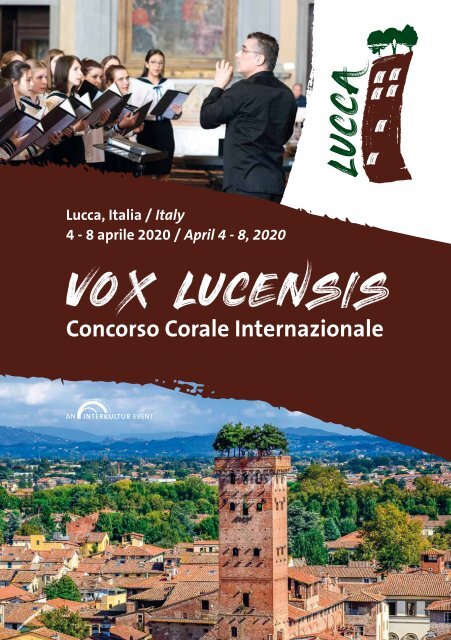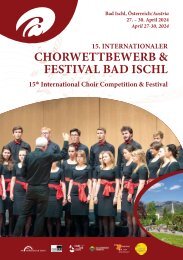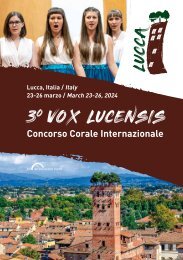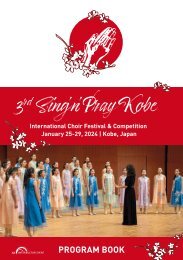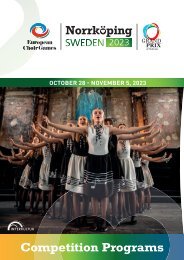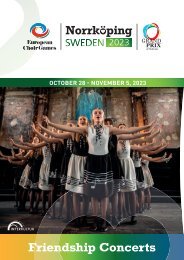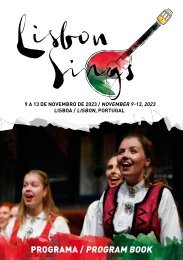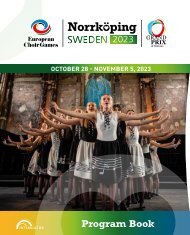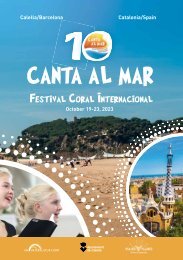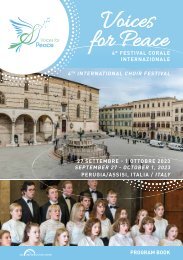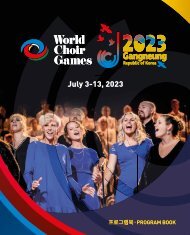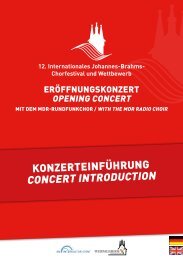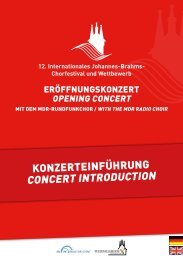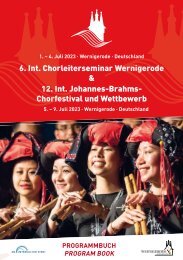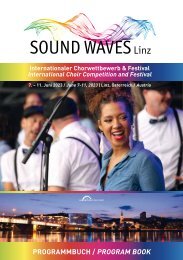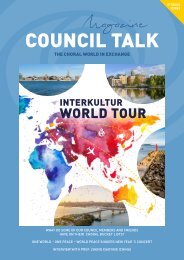Lucca 2020 - Program Book
Vox Lucensis - Concorso Corale Internazionale April 4 - 8, 2020 Lucca, Italy Lucca is a source of inspiration for choristers from all over the world: This city of art-historical significance in Tuscany gave birth to great musicians like Giacomo Puccini, Luigi Boccherini, Alfredo Catalani and Francesco Geminiani. For four days the historic center of Lucca will host the new choir competition "Vox Lucensis" in spring 2020 and voices of choirs from all over the world will resonate in an enchanting affiliation of music and songs of different cultures. A great opportunity for artistic improvement and an experience to reverberate for a long time! The Conservatory "Luigi Boccherini " and the church of San Paolino provide perfect conditions for competition categories of secular and sacred music as well as for pleasing evening concerts. Also the Auditorium of San Romano and other precious churches in the city will be available for concerts. Apart from the choir competition you also have the chance to experience the rich culture and beauty of Tuscany. World famous cities like Pisa, Florence, Torre del Lago Puccini and Massa Carrara are just a stone’s throw away from Lucca.
Vox Lucensis - Concorso Corale Internazionale
April 4 - 8, 2020 Lucca, Italy
Lucca is a source of inspiration for choristers from all over the world: This city of art-historical significance in Tuscany gave birth to great musicians like Giacomo Puccini, Luigi Boccherini, Alfredo Catalani and Francesco Geminiani.
For four days the historic center of Lucca will host the new choir competition "Vox Lucensis" in spring 2020 and voices of choirs from all over the world will resonate in an enchanting affiliation of music and songs of different cultures. A great opportunity for artistic improvement and an experience to reverberate for a long time!
The Conservatory "Luigi Boccherini " and the church of San Paolino provide perfect conditions for competition categories of secular and sacred music as well as for pleasing evening concerts. Also the Auditorium of San Romano and other precious churches in the city will be available for concerts.
Apart from the choir competition you also have the chance to experience the rich culture and beauty of Tuscany. World famous cities like Pisa, Florence, Torre del Lago Puccini and Massa Carrara are just a stone’s throw away from Lucca.
- No tags were found...
You also want an ePaper? Increase the reach of your titles
YUMPU automatically turns print PDFs into web optimized ePapers that Google loves.
<strong>Lucca</strong>, Italia / Italy<br />
4 - 8 aprile <strong>2020</strong> / April 4 - 8, <strong>2020</strong><br />
VOX LUCENSIS<br />
Concorso Corale Internazionale
2<br />
Anzeige
3<br />
VOX LUCENSIS<br />
Concorso Corale Internazionale<br />
<strong>Lucca</strong>, Italia / Italy<br />
4 - 8 aprile <strong>2020</strong> / April 4 - 8, <strong>2020</strong><br />
Organizzatori / Organizer<br />
Interkultur (Germania / Germany)<br />
In collaborazione con / In cooperation with<br />
Associazione Coro Voci Bianche Cappella Santa Cecilia di <strong>Lucca</strong><br />
Patrocinio / Patronage<br />
Comune di <strong>Lucca</strong><br />
Associazione Cori della Toscana<br />
Presidente INTERKULTUR / President INTERKULTUR<br />
Günter Titsch (Germania / Germany)<br />
Direttori artistici Vox Lucensis <strong>2020</strong> / Artistic Directors Vox Lucensis <strong>2020</strong><br />
M° Giovanni Acciai (Italia / Italy)<br />
M° Sara Matteucci (Italia / Italy)<br />
Comitato artistico di INTERKULTUR / Artistic Committee INTERKULTUR<br />
Prof. Dr. Ralf Eisenbeiß Germania / Germany) , Senior Artistic Director<br />
Johan Rooze (Paesi Bassi / Netherlands)<br />
Fred Sjöberg (Svezia / Sweden)<br />
Assoc. Prof. Romāns Vanags (Lettonia / Latvia)<br />
Direzione organizzativa / Project Director<br />
Rossana Toesco (Italia / Italy)<br />
Comitato di presidenza INTERKULTUR / Executive Committee INTERKULTUR<br />
Günter Titsch (Germania / Germany)<br />
Qin Wang (Cina / China)<br />
Stefan Bohländer (Germania / Germany)<br />
Dr. Christoph Wirtz (Germania / Germany) , segretario generale / Secretary General
4
5<br />
Indice / Table of contents<br />
pag. / Page<br />
Organizzatori / Organizer<br />
Indice / Table of contents<br />
Nazionalità dei cori partecipanti / Nationality of the participating choirs<br />
Saluti / Greetings<br />
INTERKULTUR<br />
… costruire ponti per incontrarsi. / … Connecting Bridges<br />
<strong>Lucca</strong>, un passato musicale / <strong>Lucca</strong>, a musical Past<br />
Direttori artistici e Giuria / Artistic Directors and Jury<br />
<strong>Program</strong>ma generale / General Schedule<br />
Concerto di apertura / Opening Concert<br />
Concerto “Triduum Sacrum – Responsoria” (Leonardo Leo)<br />
<strong>Program</strong>ma del Concorso / Competition program<br />
Cori partecipanti / Participating choirs<br />
Pianta di <strong>Lucca</strong> / Town map<br />
Stampa e Team / Imprint & Team<br />
xx<br />
xx<br />
xx<br />
xx<br />
xx<br />
xx<br />
xx<br />
xx<br />
xx<br />
xx<br />
xx<br />
xx
6<br />
Nazionalità dei cori partecipanti<br />
Nationality of the participating choirs<br />
Belgio<br />
Belgium<br />
Italia<br />
Italy<br />
Danimarca<br />
Denmark<br />
Lettonia<br />
Latvia<br />
Estonia<br />
Estonia<br />
Russia<br />
Russia<br />
Finlandia<br />
Finland<br />
Slovenia<br />
Slovenia<br />
Germania<br />
Germany<br />
Svezia<br />
Sweden<br />
Gran Bretagna<br />
Great Britain<br />
Turchia<br />
Turkey<br />
Indonesia<br />
Indonesia
7
8<br />
© Studi43
SALUTI<br />
GREETINGS<br />
9
10<br />
Günter Titsch<br />
Presidente di INTERKULTUR<br />
President INTERKULTUR<br />
Cari Amici della musica corale,<br />
sono lieto di darvi il benvenuto a questa prima<br />
edizione del Concorso Corale Internazionale<br />
VOX LUCENSIS nell’incantevole città di <strong>Lucca</strong>,<br />
con il suo centro storico romano-medievale,<br />
i suoi caratteristici vicoli ritorti e le sue piazze<br />
irregolari. Questa magica cornice è ideale<br />
per fondervi arte musicale, cultura e attività<br />
escursionistiche nella stessa <strong>Lucca</strong> ma anche<br />
negli altrettanto illustri dintorni: Torre del Lago<br />
Puccini, Pisa, Firenze, sono alcune tra le ridenti<br />
località di una regione che offre arte, tradizione<br />
e ospitalità.<br />
Con questo nuovo festival corale Interkultur<br />
intende ampliare la sua programmazione<br />
in Italia corrispondendo così al sempre più<br />
crescente interesse verso nuove manifestazioni<br />
in Europa in particolare nella fascia<br />
mediterranea.<br />
Voglio anche ricordare l’undicesima edizione<br />
dei nostri World Choir Games <strong>2020</strong> che si<br />
svolgeranno il prossimo luglio nelle città di<br />
Anversa e Gent, nella regione belga delle Fiandre<br />
e sarà ancora una volta il più grande concorso<br />
corale del mondo, ossia una straordinaria<br />
opportunità per “cantare insieme”, forti nella<br />
convinzione che non esista un modo migliore<br />
per contribuire alla causa della comprensione<br />
tra i popoli e della pace nel mondo.<br />
Ma ora desidero ringraziare tutti coloro<br />
che hanno reso questo festival possibile.<br />
Anzitutto l’Associazione Coro Voci Bianche<br />
della Cappella S. Cecilia di <strong>Lucca</strong>, nella persona<br />
di Sara Matteucci che per prima ha creduto<br />
nel nostro progetto e che ci ha sostenuto<br />
con instancabile dedizione, e alla Cappella<br />
Musicale S. Cecilia della Cattedrale di <strong>Lucca</strong>.<br />
Ringraziamo la presidenza e il formidabile staff<br />
dell’Istituto Musicale “Luigi Boccherini” per aver<br />
“sopportato” la pacifica invasione dei nostri cori,<br />
il Comune di <strong>Lucca</strong>, i parroci, don Lucio Malanca,<br />
Santi Paolino e Donato e don Mauro Lucchesi<br />
del Duomo di San Martino, le Terme Excelsior<br />
di Montecatini, tutti i nostri collaboratori e<br />
volontari per il lavoro svolto. Un ringraziamento<br />
particolare all’Ensemble Nova Ars Cantandi e<br />
un abbraccio, con immutata profonda stima, a<br />
Giovanni Acciai.<br />
Grazie ai cori partecipanti confluiti qui a <strong>Lucca</strong><br />
da ben quattordici Paesi: a tutti loro auguro un<br />
piacevole soggiorno e successo, in un sereno<br />
confronto di crescita artistica e culturale,<br />
sperando ne conservino un buon ricordo. I<br />
migliori auspici a Vox Lucensis, nella prospettiva<br />
di un grande sviluppo della manifestazione<br />
negli anni a venire.<br />
Günter Titsch
11<br />
Dear Friends of choral music,<br />
we are pleased to welcome you to our first VOX<br />
LUCENSIS International Choral Competition in<br />
the enchanting city of <strong>Lucca</strong>, with its historic<br />
Roman-medieval center, its characteristic twisted<br />
“vicoli” and its irregular squares. This magical<br />
setting is ideal for merging musical art, culture<br />
and hiking activities in <strong>Lucca</strong> itself but also in the<br />
equally illustrious surroundings: Torre del Lago<br />
Puccini, Pisa, Florence, are some of the delightful<br />
places in a region that offers art, tradition and<br />
hospitality.<br />
With this festival, Interkultur will expand its<br />
activities in Italy and thus help attract more<br />
interest and demands for such unique festival<br />
venues, especially in the Mediterranean regions<br />
of Europe.<br />
I would also like to mention the eleventh edition<br />
of our World Choir Games <strong>2020</strong> which will take<br />
place next July in the cities of Antwerp and Gent,<br />
in the Belgian region of Flanders and will once<br />
again be the largest choral competition in the<br />
world, which is an extraordinary opportunity<br />
to "sing together”. We want to persevere in the<br />
belief that there is no better way to contribute<br />
to the cause of understanding between peoples<br />
and peace in the world.<br />
But now I want to thank everyone who made this<br />
festival possible, and first of all the Association<br />
“Coro Voci Bianche della Cappella S. Cecilia di<br />
<strong>Lucca</strong>”, particularly to Sara Matteucci who first<br />
believed in our project and who supported us<br />
with tireless dedication. We thank the presidency<br />
and the formidable staff of the "Luigi Boccherini"<br />
Music Institute for supporting us and for<br />
"enduring" the peaceful invasion of our choirs,<br />
the Municipality of <strong>Lucca</strong>, the parish priests,<br />
Don Lucio Malanca, Santi Paolino and Donato<br />
and Don Mauro Lucchesi of the Cathedral of<br />
San Martino, the Terme Excelsior of Montecatini,<br />
and of course, our staff members and volunteers<br />
for the work done. Special thanks to Nova Ars<br />
Cantandi and a big hug, with unchanged deep<br />
esteem, to Giovanni Acciai.<br />
Thanks to the participating choirs gathered here<br />
in <strong>Lucca</strong> from fourteen countries: I wish them<br />
all a pleasant stay and success, in a peaceful<br />
confrontation of artistic and cultural growth,<br />
hoping they will keep a good memory. Good Luck<br />
to Vox Lucensis, for a brilliant development of<br />
this event in the years to come.<br />
Günter Titsch
12<br />
Alessandro Tambellini<br />
Sindaco di <strong>Lucca</strong><br />
Mayor of <strong>Lucca</strong><br />
Text it<br />
Text gb
13
14<br />
© Studi43
INTERKULTUR<br />
15
16<br />
INTERKULTUR - Costruire ponti per incontrarsi.<br />
30 anni di successi: fondata nel 1988 da Günter Titsch, INTERKULTUR è ormai consolidata realtà<br />
leader a livello mondiale nella realizzazione di concorsi e festival corali internazionali, conosciuti<br />
e apprezzati per i loro elevati standard artistici e organizzativi. INTERKULTUR è un punto di<br />
riferimento e motivo di entusiasmo in costante crescita per i cori di tutto il mondo.<br />
Da più di un trentennio i coristi di tutto il mondo conoscono per esperienza diretta i festival di<br />
INTERKULTUR poiché essi stessi ne sono stati i protagonisti in diverse città e in diversi continenti.<br />
Che si tratti del Palau de la Música a Barcellona o della Konzerthaus di Vienna, o di luoghi da<br />
sogno in Sudafrica o in Vietnam: ovunque si svolgano, i nostri festival garantiscono un alto livello<br />
artistico in una cornice di pacifica competizione e di un sempre emozionante scambio culturale,<br />
che ritroviamo anche nei concerti in amicizia e nei canti a cori uniti.<br />
INTERKULTUR unisce le nazioni<br />
Nel 2004 e nel 2006, dopo lunghe trattative, è stato possibile riunire sullo stesso palco cori di<br />
Corea del Nord e del Sud; così come la partecipazione nello steso festival di Paesi come Iran ed<br />
Israele, che esibendosi nei concerti di amicizia costituiscono un significativo bagliore di pace.<br />
Partecipare è l’onore più grande<br />
Il più grande successo di INTERKULTUR è stato quello di portare l'antica idea olimpica nella<br />
comunità corale. Con la prima edizione della Choir Olympics di Linz (Austria), nel 2000 ha avuto<br />
inizio un movimento corale che continua oggi fervido in tutto il mondo. Una serie di successi che<br />
sono stati bissati da un’edizione dopo l’altra: Busan nel 2002 (Corea del Sud) e Brema (Germania)<br />
nel 2004, dal 2006 con la denominazione di World Choir Games (WCG) a Xiamen, in Cina, e poi<br />
in Austria a Graz nel 2008, in Cina a Shaoxing nel 2010, a Cincinnati (USA) nel 2012, a Riga, in<br />
Lettonia nel 2014 e nel 2016 nella città olimpica invernale di Sochi, Russia. Il decimo anniversario<br />
dei World Choir Games si è svolta nel luglio 2018 a Tshwane (Sudafrica) - per la prima volta sul<br />
suolo africano - con più di 300 cori e oltre 16 000 partecipanti. La regione delle Fiandre del Belgio<br />
con le città di Anversa e Gent saranno invece dal 5 al 15 luglio <strong>2020</strong> le padrone di casa degli<br />
undicesimi World Choir Games, Flanders <strong>2020</strong>.<br />
Dal 2007 INTERKULTUR trasferisce l'idea dei WCG anche in diversi continenti con gli Asian Pacific<br />
Choir Games la cui quarta edizione nell’ottobre 2017 si è svolta a Colombo, la capitale dello Sri<br />
Lanka. Nel 2013 gli European Choir Games hanno debuttato a Graz, in Austria cui sono seguite<br />
le successive edizioni nel 2015 a Magdeburgo (Germania) e nel 2017 con l’aggiunta del Grand
17<br />
Prix of Nations nella capitale lettone Riga. Nell'agosto 2019 cori di tutto il mondo sono confluiti<br />
a Göteborg in Svezia, in occasione della 4a edizione dei “Grand Prix of Nations & European Choir<br />
Games”.<br />
L’idea<br />
INTERKULTUR è divenuto ormai sinonimo di un concetto artistico unico nel suo genere<br />
introducendo molte novità rispetto al passato. Mentre importanti concorsi corali tradizionali sono<br />
riservati soltanto a cori appartenenti a un élite a livello internazionale, i festival di INTERKULTUR,<br />
collocandosi parallelamente alla forma tradizionale, aprono le porte a tutti i cori desiderosi di<br />
vivere l’esperienza di un confronto artistico in campo internazionale vissuto come momento di<br />
crescita. Con l’idea dei World Choir Games - INTERKULTUR ha trovato la direzione che incoraggia<br />
il movimento corale internazionale verso nuovi impulsi e prospettive, incontrando anche - strada<br />
facendo - l’approvazione di capi di stato quali Xi Jinping, Barack Obama e Vladimir Putin.<br />
I concorsi<br />
Il nuovo concetto di base si rende concreto nella realizzazione di concorsi che offrono più<br />
categorie divise per gradi di difficoltà per tutti i tipi di coro con o senza brani d’obbligo. In essi<br />
si vive un’atmosfera unica, in cui si offrono condizioni di partecipazione vantaggiose, dense<br />
occasioni di contatti artistici, interessanti workshops e consultazioni con esperti prima e dopo la<br />
prova in concorso vera e propria. Più di 200 tra esperti e direttori di coro in campo internazionale<br />
garantiscono la competente professionalità che contraddistingue le manifestazioni di<br />
INTERKULTUR.<br />
Il sistema di valutazione<br />
La giuria assegna nei concorsi di INTERKULTUR diplomi corrispondenti ai dieci livelli nelle fasce<br />
oro, argento e bronzo in base al particolare sistema di valutazione di MUSICA MUNDI® (o<br />
Sistema a 30 punti) e medaglie d’oro, d’argento e di bronzo nei World Choir Games, nei “World<br />
Choir Championships & Grand Prix of Nations” in base al sistema di valutazione dei World Choir<br />
Games (o Sistema a 100 punti).<br />
In ogni categoria si può avere un “vincitore” o un “campione” ma anche premi speciali per<br />
esibizioni di particolare interesse. Alcuni concorsi contemplano la competizione riservata ai<br />
vincitori di categoria per l’assegnazione del “Gran Premio” al coro migliore, decretato così<br />
vincitore assoluto di quel concorso.<br />
La funzione pedagogica<br />
Le manifestazioni di INTERKULTUR non sono solamente concorsi e festival internazionali.<br />
Momento di grande interesse per i partecipanti sono le numerose occasioni di perfezionamento<br />
fondate su una grande competenza artistica e pedagogica. Durante la fase della consultazione<br />
per esempio, i cori hanno la possibilità di lavorare insieme a giurie internazionali ricevendo<br />
opinioni in merito al livello artistico oltre a preziosi consigli pedagogico-artistici per affrontare<br />
meglio l’interpretazione del programma scelto. Seminari mirati come la MUSICA MUNDI® Choir<br />
Academy costituiscono vere e proprie fucine di nuovi impulsi che spesso ritroviamo nelle attività<br />
di giovani direttori specialmente cinesi.<br />
Ogni due anni, il World Choir Council con i suoi 114 membri in rappresentanza di 86 nazioni,<br />
si riunisce in seno ai World Choir Games per fare il punto sulle rispettive realtà corali nazionali.<br />
Questo incontro offre un contributo importante allo sviluppo di tutto il panorama corale<br />
internazionale.
18<br />
I Paesi ospitanti i nostri festival<br />
I festival di INTERKULTUR si sono svolti in Austria, Belgio, Cina, Corea del Sud, Croazia, Francia,<br />
Germania, Giappone, Grecia, Indonesia, Israele, Italia, Lettonia, Malesia, Malta, Portogallo,<br />
Repubblica Ceca, Russia, Serbia, Spagna, Sri Lanka, Svezia, Sudafrica, Tailandia, Ungheria, USA e<br />
Vietnam. Nei prossimi mesi INTERKULTUR sarà presente per la prima volta nei Paesi Bassi.<br />
Sulla scia del successo di INTERKULTUR, sempre più città si convincono della validità del<br />
progetto aderendovi per ospitare con regolarità classici festival o eventi di maggiore portata<br />
internazionale.<br />
I partecipanti<br />
In totale, 10.000 cori con più di 435.000 partecipanti provenienti da 107 nazioni hanno preso<br />
parte fino ad oggi ai festival di INTERKULTUR. È interessante notare come più della metà dei<br />
partecipanti sia costituita da cori di bambini e cori giovanili i cui membri hanno meno di 27 anni<br />
di età e il 67% dei cori partecipanti torna ai nostri festival per conoscere nuove destinazioni e per<br />
confrontarsi su nuove prove artistiche. Molti tra loro migliorano costantemente i loro traguardi,<br />
dai primi piccoli successi alla medaglia d'oro o all'ambito titolo di Champions.<br />
Finalità di sostegno<br />
In virtu’ del suo statuto INTERKULTUR persegue le seguenti attività:<br />
• promuovere festival musicali internazionali il cui scopo è di avvicinare cori di diversi paesi e<br />
culture favorendo la collaborazione internazionale attraverso il rispetto reciproco e<br />
contribuire così alla comprensione tra i popoli<br />
• favorire la partecipazione di formazioni corali di bambini e giovanili provenienti da paesi<br />
economicamente deboli, in particolare<br />
• favorire l’attività di cori amatoriali, specialmente di giovani, sia a livello locale o<br />
internazionale, che dimostrano costante sviluppo artistico<br />
• sostenere l’impegno di promettenti direttori di coro, musicisti e coristi con l’assegnazione di<br />
buoni studio<br />
• sponsorizzare progetti specifici<br />
… Connecting Bridges<br />
30 years of success: Since 1988 INTERKULTUR, founded by Günter Titsch, is the world’s leading<br />
organizer of international choir competitions and festivals. The event series has meanwhile become<br />
known throughout the world for its high artistic and organizational standards. INTERKULTUR is a<br />
concept for choirs all over the world and their excitement about its competitions and festivals is<br />
constantly growing.<br />
Since more than 30 years singers and choirs from all over the world have been celebrating international<br />
choral music with INTERKULTUR in different cities and on different continents. Whether the Palau de<br />
la Música in Barcelona or the Konzerthaus Vienna, whether dream destinations in South Africa or<br />
Vietnam; wherever they go participants will experience a peaceful, world-spanning festival of singing<br />
and intercultural choral music on a high artistic level. Friendship Concerts and joint singing events<br />
complete the great emotional impact of INTERKULTUR’s international choral meetings.
19<br />
INTERKULTUR unites nations. In 2004 and 2006 – following long negotiations – the organization was<br />
able to bring choirs from North and South Korea together on stage. Also choirs from countries like<br />
Israel and Iran keep coming together at the choir festivals and light a beacon of peace in Friendship<br />
Concerts.<br />
Participation is the highest honor. INTERKULTUR´s biggest success to date was to bring the antique<br />
Olympic idea to the choral community. The Choir Olympics 2000 in Linz, Austria was the beginning of<br />
a Choir Olympic movement, which goes around the world until today: Its story of success continues<br />
with subsequent events in Busan, Republic of Korea in 2002, and Bremen, Germany in 2004 and as<br />
of in 2006 under the name “World Choir Games” in Xiamen, China, Graz, Austria in 2008, Shaoxing,<br />
China in 2010, and Cincinnati, USA in 2012, Riga, Latvia in 2014, and the Winter Olympic City of Sochi,<br />
Russia in 2016. The 10th anniversary edition of the World Choir Games in 2018 happened on African<br />
soil for the first time: Tshwane in South Africa attracted more than 300 choirs and more than 16 000<br />
participants in July 2018. The cities of Antwerp and Ghent in Belgium have been announced the hosts<br />
for the 11 th World Choir Games Flanders <strong>2020</strong> to be held from July 5-15, <strong>2020</strong>.<br />
Since 2007 INTERKULTUR has been transferring the idea of the World Choir Games also to different<br />
continents: The Asia Pacific Choir Games took place for the 4 th time already in October 2017. Host city<br />
was the Sri Lankan capital Colombo. In 2013 the European Choir Games premiered in Graz, Austria.<br />
Subsequent editions of the event were held in Magdeburg, Germany (2015) and in the Latvian capital<br />
Riga (2017), along with the Grand Prix of Nations, which addresses international top choirs. In August<br />
2019 choirs from all over the world will meet in Gothenburg (Sweden) for the 4th edition of the Grand<br />
Prix of Nations & European Choir Games.<br />
The Idea<br />
INTERKULTUR has become the symbol for a unique artistic idea: In comparison to traditional<br />
meritorious choir competitions that only invite international elite choirs to take part the INTERKULTUR<br />
competitions are open to all non-professional choirs. Choirs from all over the world, interested in<br />
gaining international festival and competition experience, can compete according to their level of<br />
artistic achievement. INTERKULTUR has opened a door to new impulses and perspectives for the<br />
national and international choral movement. Many international head of states supported this idea<br />
in the past, among them Xi Jinping (China), Barack Obama (USA) and Vladimir Putin (Russia).<br />
The Competitions<br />
There are various categories for all types and levels of choirs in different degrees of difficulty, with<br />
or without compulsory pieces. The competitions offer good competitive conditions, valuable artistic<br />
contacts, various workshops and seminars, as well as practice opportunities with international<br />
performers. More than 200 experts and leading choirmasters from all over the world guarantee a<br />
high level of expertise in all INTERKULTUR events.<br />
Evaluation System<br />
The jury awards Bronze, Silver, and Gold Diplomas on 10 levels at INTERKULTUR competitions<br />
according to the MUSICA MUNDI® evaluation system (30-points-system); and Bronze, Silver and Gold<br />
Medals at the World Choir Games, the World Choir Championships and the Grand Prix of Nations<br />
according to the World Choir Games evaluation system (100-points-system). In each category, a<br />
Winner or Champion is determined and outstanding achievements are honored with Special Prizes. In<br />
some competitions there is a Grand Prize Competition of the best choirs selected by the international<br />
jury which determines the overall winner of the competition.
20<br />
The Pedagogical Concept<br />
INTERKULTUR events are not only competitions and international choir festivals, but also provide<br />
professional competence. Choirs are able to receive feedback from various pedagogical offerings. In<br />
Evaluation Performances or Individual Coaching, choirs have the chance to work with international<br />
jury members and gain advice on their current level of achievement, receive proficient pedagogical<br />
and artistic information and obtain suggestions as to how to interpret the chosen piece. The MUSICA<br />
MUNDI® Choir Academy gives new impetus especially to young choir conductors in China. Every two<br />
years the World Choir Council consisting of currently 120 members representing 91 nations comes<br />
together during the World Choir Games to discuss the choral scenes in their respective home countries.<br />
These meetings make an important contribution to the development of the international choral<br />
scene.<br />
Locations of Festivals and Competitions<br />
To date, INTERKULTUR events have taken place in Austria, Belgium, Czech Republic, Croatia, France,<br />
Germany, Greece, Hungary, Indonesia, Israel, Italy, Japan, Latvia, Malaysia, Malta, Netherlands,<br />
People’s Republic of China, South Africa, Portugal, Philippines, Republic of Korea, Russia, Serbia, Spain,<br />
Sri Lanka, Sweden, Thailand, USA and Vietnam. In <strong>2020</strong> INTERKULTUR will organize an international<br />
choir competition in the Ukraine and in Albania for the first time. Many cities have been convinced<br />
of the success of INTERKULTUR events and establish regular choir festivals or apply repeatedly to host<br />
more unifying major events.<br />
The Participants<br />
In total, roughly 10.000 choirs with about 435.000 active singers from 107 countries have taken<br />
part in the INTERKULTUR competitions to date. An interesting note is that more than half of the<br />
participants have been children and youth up to 27 years of age and 67% of the participating choirs<br />
are returning ensembles looking forward to new destinations and new choral challenges. Many<br />
of them constantly increase their achievements – from first little successes to a Gold Medal or the<br />
sought-after Champions title.<br />
Means of Support<br />
In accordance with its statutes, INTERKULTUR supports the following activities:<br />
• International music festivals and choir competitions whose goal is to bring together choirs from<br />
different regions of the world and encourage international collaboration through mutual respect,<br />
as well as to contribute to cultural exchange and understanding among nations<br />
• Children and youth choirs even from financially challenged countries<br />
• Non-professional choirs that focus on the growth of youth development<br />
• Young, talented choirmasters, young musicians and singers through the support of scholarship<br />
awards<br />
• Specific sponsorship opportunities<br />
INTERKULTUR World Rankings<br />
Potrete trovare World Ranking List - TOP choirs, classifiche e<br />
statistiche sempre aggiornate sui nostri concorsi consultando il<br />
nostro sito / World Ranking List - TOP Choirs, results and updated<br />
statistics about our festivals on our web site<br />
www.interkultur.com
© Fotolia<br />
21
© Fotolia<br />
22
LUCCA, UN PASSATO MUSICALE<br />
LUCCA, A MUSICAL PAST<br />
23
24<br />
<strong>Lucca</strong>, un passato musicale<br />
<strong>Lucca</strong>, a musical Past<br />
La storia della città affonda le sue origini nei popoli liguri e forse, in quella degli etruschi. Il suo primo<br />
sviluppo come città ebbe inizio in epoca romana (180 a.C.), come la costruzione dell’antico nucleo<br />
della città stessa testimonia: sono infatti ancora ben visibili il Cardo (via Fillungo - via Cenami) e<br />
il Decumano (via San Paolino - via Roma - via Santa Croce), ovvero gli assi lungo i quali si espanse<br />
l’insediamento romano, con il Foro (l’attuale piazza S. Michele) e l’Anfiteatro. Sempre in questo<br />
periodo fu realizzata la prima cinta muraria. Dal 400 <strong>Lucca</strong> fu occupata dagli Ostrogoti, poi dai<br />
Bizantini, quindi dai Longobardi, sotto i quali divenne Curtis Regia mentre nel 773 la città entrò<br />
a far parte dell’Impero Carolingio. Per secoli <strong>Lucca</strong>, non solo conservò una posizione di rilevanza<br />
nell’impero, ma riuscì anche a dare il via a un periodo di grande crescita, grazie alla produzione<br />
di raffinati tessuti di seta e grazie alla presenza del Volto Santo, che attirava in città moltissimi<br />
pellegrini in viaggio verso Roma, lungo la via Francigena. Nel Medioevo, infatti, la città divenne uno<br />
dei centri più importanti della Toscana e, dopo un breve periodo della Repubblica, la città divenne<br />
Signoria sotto Paolo Guinigi (marito di Ilaria dal Carretto) e poi Repubblica Aristocratica. Per tutto<br />
il secolo, <strong>Lucca</strong> incrementò i suoi commerci, grazie ai suoi abili mercanti di seta e banchieri. La<br />
città cambiò volto, demolendo le torri medievali e costruendo le mura cittadine che ancora oggi la<br />
caratterizzano.<br />
<strong>Lucca</strong> visse in pace e rimase una repubblica fino al 1799, quando la città fu invasa dall'esercito<br />
francese di Napoleone: l’imperatore concesse a <strong>Lucca</strong> lo status di Repubblica, fino al 1805, quando<br />
la trasformò in Principato, governato dalla maggiore delle sue sorelle Elisa Baciocchi. Per oltre metà<br />
dell'Ottocento <strong>Lucca</strong> conobbe un periodo favorevole di sviluppo economico, grazie soprattutto alla<br />
tessitura e all'industria cartaria. Il congresso di Vienna del 1815 assegnò il Ducato di <strong>Lucca</strong> a Maria<br />
Luigia di Borbone ma nel 1847 il figlio Carlo Ludovico la cedette al Granducato di Toscana fino al<br />
1861, quando entrò a far parte dello Stato Italiano, perdendo così la sua secolare indipendenza.
Fin dal Medioevo, ma in particolare dal XVI secolo, <strong>Lucca</strong> è stata inoltre affollata di musica e musicisti<br />
e si è distinta per produzione e organizzazione di eventi musicali. In un contesto di attività musicale<br />
ricca, variegata e continua nel tempo sono emerse delle vere e proprie eccellenze: nessun’altra città<br />
italiana, o europea di dimensioni paragonabili, potrebbe vantare un elenco di musicisti, come –<br />
per citarne solo alcuni – Francesco Barsanti, Francesco Geminiani, Giacomo Puccini senior, Filippo<br />
Manfredi, Luigi Boccherini, Antonio Puccini, Domenico Puccini, Michele Puccini, Gaetano Luporini,<br />
Alfredo Catalani e, ovviamente, il grande compositore Giacomo Puccini che con le sue opere<br />
liriche ha reso la città di <strong>Lucca</strong> famosa in tutto il mondo. Testimonianze di questa grandezza sono<br />
alcune delle stesse istituzioni della città associate ad eventi che hanno sostanziato la storia della<br />
musica a <strong>Lucca</strong>: dalla storica Cappella di Palazzo all’Istituto Musicale “Boccherini”, dal Teatro del<br />
Giglio alle musiche composte ogni anno per la festa di Santa Croce. Anche oggi la città di <strong>Lucca</strong><br />
è incredibilmente vivace a livello sia di produzione sia di fruizione musicale. Molti sono i Cori e le<br />
Bande, ma altrettanto numerose sono le Istituzioni, le Fondazioni e le Associazioni musicali, nonché<br />
i Festival che creano una diffusissima presenza concertistica durante tutto l’anno.<br />
(Si ringrazia l’Ufficio Turismo del Comune di <strong>Lucca</strong> e la prof.ssa Sara Matteucci.)<br />
25
26<br />
The history of the city has its origins in Ligurian and probably Etruscan peoples. Certainly, its first<br />
real development began in Roman times (180 BC), as the construction of the ancient core of the<br />
city testifies: today the two main roman streets Cardo and Decumanus are still visible, with the<br />
ancient forum (now S. Michele square) and the Amphitheatre. In the same period the first city<br />
walls were built. From the fifth century <strong>Lucca</strong> was first occupied by the Ostrogoths, then by the<br />
Byzantines, and later by the Lombards, under whom it became one of the most important centres<br />
of the empire, thanks to the wooden “Volto Santo” cross, which attracted many pilgrims on their<br />
way along the Via Francigena route, the link between Rome and Canterbury. In 773, the city became<br />
part of the Carolingian Empire. <strong>Lucca</strong> certainly maintained an important position in the empire, but<br />
introduced furthermore a period of great growth, largely based on the silk production economy. In<br />
the Middle Ages, the ancient Roman colony became one of the most important towns in Italy. After<br />
a brief period of the republic, the city became a Signoria under Paolo Guinigi (Ilaria del Carretto's<br />
husband) and later an Aristocratic Republic; <strong>Lucca</strong> increased its trade activities, thanks to its skilled<br />
silk merchants and the bankers.<br />
Between 1400 and 1500 the city changed aspect by demolishing the medieval towers and building<br />
the city walls that still characterize its features today. <strong>Lucca</strong> lived in peace and remained a republic<br />
until 1799, when it was invaded by Napoleon's army. He granted <strong>Lucca</strong>, however, the status of a<br />
republic until 1805, when he changed it into a Principality, ruled by the eldest of his sisters, Elisa<br />
Baciocchi. During the second half of the nineteenth century, <strong>Lucca</strong> enjoyed an advantageous<br />
period of economic development, mainly due to the weaving and paper industry. In 1815, after
the Congress of Vienna, <strong>Lucca</strong> fell under Maria Luisa of Bourbon's power. The Bourbon family ruled<br />
<strong>Lucca</strong> until 1847, when finally Duke Carlo Ludovico di Borbone, signed the annexation of the city to<br />
the Grand Duchy of Tuscany, losing this way its secular independence.<br />
Since the Middle Ages, but in particular since the 16th century, <strong>Lucca</strong> has also been crowded with<br />
music and musicians and has distinguished itself for the production and organization of musical<br />
events. In a context of rich, varied and continuous musical activity over time, real excellences have<br />
emerged: no other Italian or European city of comparable size could boast a list of musicians, such<br />
as - to name just a few Francesco Barsanti, Francesco Geminiani, Giacomo Puccini senior, Filippo<br />
Manfredi, Luigi Boccherini, Antonio Puccini, Domenico Puccini, Michele Puccini, Gaetano Luporini,<br />
Alfredo Catalani and, of course, the great composer Giacomo Puccini who with his lyrical works has<br />
made the city of <strong>Lucca</strong> famous all over the world. Testimonies of this greatness can also be found<br />
in institutions and events that have substantiated the history of music in <strong>Lucca</strong>: from the historic<br />
Chapel of the Palace to the "Boccherini" Music Institute, from the Teatro del Giglio to the music<br />
composed every year for the feast of Santa Croce. Even today the city of <strong>Lucca</strong> is incredibly lively in<br />
terms of both production and musical enjoyment. There are many choirs and bands, but equally<br />
numerous are institutions, foundations and musical associations, as well as festivals and concerts<br />
that create a lively presence throughout the year.<br />
(Courtesy by Tourism Dept. Town Hall <strong>Lucca</strong> and Prof. Sara Matteucci.)<br />
27
28<br />
© Studi43
DIRETTORI ARTISTICI E GIURIA<br />
ARTISTIC DIRECTORS AND JURY<br />
29
30<br />
Italia / Italy<br />
Giovanni Acciai<br />
Giuria e Direzione artistica /<br />
Jury and Artistic Director<br />
Riconosciuto unanimemente come uno dei<br />
massimi interpreti del repertorio vocale<br />
rinascimentale e barocco, Giovanni Acciai<br />
è diplomato in organo, composizione e<br />
direzione di coro al Conservatorio “Giuseppe<br />
Verdi” di Milano e si è specializzato in<br />
Paleografia e Filologia musicale presso<br />
l’Università degli studi di Pavia. È stato<br />
direttore del Coro da camera della RAI di<br />
Roma e della Corale universitaria di Torino<br />
ed è direttore artistico e musicale degli<br />
ensemble vocali e strumentali “I Solisti<br />
del Madrigale” e “Nova ars cantandi” alla<br />
guida dei quali svolge una intensa attività<br />
concertistica e discografica. Ha al suo<br />
attivo numerose pubblicazioni di musiche<br />
antiche, saggi musicologici, edizioni<br />
critiche, incisioni discografiche di musiche<br />
inedite per le case Antes, Stradivarius, Sarx,<br />
Unda maris, Tactus e Archiv-Deutsches<br />
Grammophon. Il doppio CD con l’ensemble<br />
“Collegium Vocale et Instrumentale NOVA<br />
ARS CANTANDI dedicato agli “Armonici<br />
entusiasmi di Davide” di Giovanni Battista<br />
Bassani è stato nominato dall’International<br />
Classic Music Awards per il titolo di miglior<br />
disco dell’anno 2017 nella categoria Early<br />
Music; il CD “Contrafacta” (Monteverdi) è<br />
stato disco del mese per le riviste Classic<br />
Voice e Amadeus come lo è stato l’anno<br />
successivo il CD “Responsoria” di Leonardo<br />
Leo per la rivista di critica discografica<br />
Musica; lo stesso CD ha inoltre vinto<br />
nel 2019 il prestigioso “Premio Franco<br />
Abbiati della Critica Musicale Italiana”,<br />
conferito dall’Associazione Nazionale Critici<br />
Musicali. Accanto all’attività di docente –<br />
insegna Paleografia musicale nel corso di<br />
musicologia del Conservatorio “Giuseppe<br />
Verdi” di Milano, cura la direzione artistica<br />
dei concorsi internazionali di Quartiano,<br />
Grado, Perugia e <strong>Lucca</strong>. Giovanni Acciai<br />
viene regolarmente invitato a ricoprire<br />
l’incarico di presidente e di membro<br />
di giuria nei più importanti concorsi<br />
nazionali e internazionali di canto e<br />
composizione corale, a tenere relazioni in<br />
convegni musicologici, seminari e corsi di<br />
perfezionamento in direzione di coro sia in<br />
Italia che all’estero. Per i meriti artistici e<br />
musicali acquisiti in campo internazionale,<br />
è stato eletto nel 1991 membro onorario<br />
dell’American Choral Directors Associations<br />
(ACDA). Ha fatto parte della giuria in diverse<br />
edizioni delle Choir Olympics e in seguito<br />
dei World Choir Games del cui World Choir<br />
Council è membro attivo in rappresentanza<br />
per l’Italia dal 2004. Dal 2014 è responsabile<br />
artistico dell’Accademia di Musica Antica<br />
di Milano e dal 2015 è stato accolto, come<br />
membro individuale, nel Réseau Européen<br />
de Musique Ancienne (REMA) di Versailles.
31<br />
Unanimously recognized as one of the<br />
greatest interpreters of the Renaissance and<br />
Baroque vocal repertoire, Giovanni Acciai<br />
studied choral music, choir conducting<br />
organ and organ composition at the<br />
Conservatory “Giuseppe Verdi” in Milan,<br />
and took his master degree in musicology<br />
at Pavia University. He was conductor of<br />
the Chamber Choir and of the Symphonic<br />
Choir of the Italian Broadcast and of the<br />
Corale Universitaria of Turin. Presently, he<br />
is the conductor and artistic director of the<br />
vocal and instrumental ensembles “I Solisti<br />
del Madrigale”, and “Nova ars cantandi”,<br />
with which he carries out an intense concert<br />
and recording activity; he has published<br />
several articles and reviews on early music,<br />
musicological essays, as well as recordings<br />
of unreleased works for the publishers Antes,<br />
Stradivarius, Sarx, Unda maris, Tactus and<br />
Archiv Deutsches Grammophon. His latest<br />
CD production with Nova Ars Cantandi, the<br />
"Armonici entusiasmi di Davide" by Giovanni<br />
Battista Bassani, has been nominated for<br />
the International Classic Music Award as<br />
the best CD of the year 2017 in the category<br />
Early Music. His CD "Contrafacta" was named<br />
album of the month for the magazines<br />
Classic Voice and Amadeus as well as his CD<br />
"Responsoria" by Leonardo Leo for the music<br />
critic review Musica; this CD also won in<br />
2019 the prestigious "Franco Abbiati Prize<br />
of the Italian Music Critic", awarded by<br />
the National Association of Music Critics.<br />
Giovanni Acciai teaches musical history and<br />
early music semiography at the Conservatory<br />
“Giuseppe Verdi” in Milan, moreover he is the<br />
artistic director of the International choir<br />
competitions of Quartiano, Grado, Perugia<br />
and <strong>Lucca</strong>. He is regularly invited as an<br />
international jury member and jury president<br />
in most renewed choir competitions; he is<br />
sought after as a lecturer at conferences of<br />
musicology and asked to hold masterclasses<br />
for choral conducting in Italy and abroad.<br />
For his high-ranking international artistical<br />
achievements in 1991, he was appointed<br />
honorary member of the American Choral<br />
Directors Associations (ACDA). Giovanni<br />
Acciai was a member in the panel of the<br />
International juries at the Choir Olympics<br />
as well as the World Choir Games and since<br />
2004 he is an active member and official<br />
representative for Italy in the World Choir<br />
Games International World Choir Council.<br />
Since 2014, he is artistic director of the<br />
Accademia di Musica Antica of Milan and<br />
since 2005 active member of the Réseau<br />
Européen de Musique Ancienne” (REMA) of<br />
Versailles.
32<br />
Italia / Italy<br />
Sara Matteucci<br />
Giuria e Direzione artistica /<br />
Jury and Artistic Director<br />
Sara Matteucci è direttore di coro e<br />
musicologa. Laureata con il massimo dei<br />
voti in Storia della Musica e in Musica<br />
Corale e Direzione di Coro, è docente<br />
della cattedra di Esercitazioni Corali al<br />
Conservatorio di musica “Luigi Boccherini”<br />
di <strong>Lucca</strong>. La sua attività artistica l’ha portata<br />
a lavorare nei principali teatri italiani e<br />
all’estero, collaborando con maestri come<br />
Zubin Mehta, Fabio Luisi, Daniel Oren,<br />
Yu Feng, Hirofumi Yoshida, prendendo<br />
parte a oltre 200 allestimenti lirici e a<br />
numerose produzioni sinfonico-corali tra<br />
cui la Sinfonia n.9 di Beethoven, Requiem<br />
di Mozart, Chichester Psalms di Bernstein,<br />
Messa a 4 voci di Puccini, Sinfonia n. 8 di<br />
Mahler, Requiem di Cherubini, Carmina<br />
Burana di Orff, Petite Messe di Rossini, ecc.<br />
È maestro preparatore del coro delle Voci<br />
Bianche del Maggio Musicale Fiorentino<br />
e dal 1996 dirige le voci bianche del<br />
Teatro del Giglio e Cappella “S. Cecilia” di<br />
<strong>Lucca</strong>, con le quali svolge intensa attività<br />
concertistica. Dal 2010 al 2016 è stata<br />
anche maestro delle voci bianche e coro<br />
giovanile del Festival Puccini di Torre del<br />
Lago. È spesso invitata a far parte di giurie<br />
in concorsi corali nazionali e internazionali.<br />
Direttore della rivista musicologica «Codice<br />
602» (ed. Sillabe), partecipa come relatore<br />
a conferenze e convegni e ha all’attivo<br />
numerose pubblicazioni.<br />
Sara Matteucci is a Choral Conductor and<br />
musicologist. A graduate of Choral Music<br />
and Choral Conducting and of History of<br />
Music, she is professor of Choral Singing at<br />
“Luigi Boccherini” Conservatory of <strong>Lucca</strong>.<br />
With her choruses she has performed<br />
at premier theatres in Italy and abroad,<br />
collaborating with renowned personalities<br />
such as Zubin Mehta, Fabio Luisi, Daniel<br />
Oren, Yu Feng, Hirofumi Yoshida, and<br />
participating in over 200 opera productions<br />
and numerous symphonic-choral concerts,<br />
including Beethoven’s 9th Symphony,<br />
Mozart’s Requiem, Bernstein’s Chichester<br />
Psalms, Puccini’s Mass, Mahler’s Symphony<br />
n.8, Cherubini’s Requiem, Orff’s Carmina<br />
Burana and Rossini’s Petite Messe, among<br />
others. She is the preparer of the Children’s<br />
Choir at the Opera Theatre of Florence and<br />
Maggio Musicale Fiorentino, and since 1996<br />
she has conducted the Children’s Choir of the<br />
Opera Theatre and “Santa Cecilia” Chapel of<br />
the Cathedral of <strong>Lucca</strong>, with an active concert<br />
schedule. From 2010 to 2016 she has also<br />
been choral conductor at “Puccini Festival”<br />
of Torre del Lago. She is often invited to be<br />
part of the jury of national and international<br />
choral competitions. Director of musicology<br />
periodical «Codice 602», she had also several<br />
books published and has been lecturer for<br />
many music conferences and conventions.
33<br />
Belgio / Belgium<br />
Erika Budai<br />
Giuria<br />
Jury<br />
Erika Budai è pianista e musicista<br />
professionista presso la Royal Music<br />
Academy di Bruxelles e Lemmens Institute<br />
of Louvain (Belgio). Ha frequentato corsi<br />
di perfezionamento in composizione in<br />
Germania con Karl-Heinz Stockhausen e<br />
Wolfgang Rihm, e ha partecipato a corsi di<br />
didattica corale in Belgio, Italia, Ungheria<br />
e Israele. Ha ricevuto numerosi incarichi<br />
per il Belgian Radio Choir e ha composto<br />
una grande quantità di brani obbligatori<br />
destinati a concorsi corali nazionali e<br />
internazionali, in totale è autrice di circa<br />
160 composizioni principalmente per<br />
musica corale e da camera. Erika Budai<br />
viene regolarmente invitata a fare parte<br />
della giuria in concorsi musicali nazionali<br />
e internazionali in Belgio, Italia, Slovacchia<br />
e Croazia. Attualmente è docente di<br />
composizione e armonia al Conservatorio di<br />
Musica di Louvain (Belgio).<br />
Erika Budai studied as a pianist and<br />
professional musician at the Royal Music<br />
Academy of Brussels and Lemmens Institute<br />
of Louvain (Belgium). She participated in<br />
composition master classes in Germany<br />
under Karl-Heinz Stockhausen and Wolfgang<br />
Rihm, as well as attending choral education<br />
in Belgium, Italy, Hungary and Israel.<br />
Erika Budai received several numbers of<br />
commissions for the Belgian Radio Choir<br />
and composed a great deal of compulsory<br />
pieces for national and international choir<br />
competitions. So far she has composed<br />
approximately 160 works, mostly for choral<br />
and chamber music. Erika Budai is regularly<br />
invited as a jury member at national<br />
and international music competitions in<br />
Belgium, Italy, Slovakia and Croatia. She is<br />
appointed as a teacher of music composition<br />
and harmony at the Music Conservatory of<br />
Louvain (Belgium).
34<br />
Svezia / Sweden<br />
Peter Pontvik<br />
Giuria<br />
Jury<br />
© Iman Khayyatan<br />
Peter Pontvik ha studiato direzione corale,<br />
composizione e musicologia in Uruguay e<br />
composizione con Sven-David Sandström<br />
al Royal College of Music di Stoccolma e<br />
con Wolfgang Rihm a Karlsruhe. Le sue<br />
composizioni includono opere per coro<br />
come Sagitra e Amen, il ciclo Norr om<br />
Himlen, una Missa Brevis e Candombe<br />
per orchestra di fiati. Pontvik ha svolto<br />
un’approfondita ricerca nel campo della<br />
musica barocca latinoamericana; ha<br />
fondato l'Ensemble Villancico nel 1995 di cui<br />
è il direttore artistico. È inoltre fondatore e<br />
dal 2002 direttore artistico dello Stockholm<br />
Early Music Festival. È anche il presidente di<br />
NORDEM (Nordic Early Music). In qualità di<br />
presidente del REMA, European Early Music<br />
Network, nel 2013 ha creato la "European<br />
Early Music Day". Pontvik ha ricevuto il<br />
Primo Premio di Composizione Corale a<br />
Tolosa, in Spagna, il "Promotore Culturale<br />
dell'Anno" dell'Associazione Svedese dei<br />
Festival, e il Premio svedese per la musica<br />
antica.<br />
Peter Pontvik studied choral conducting,<br />
composition and musicology in Uruguay<br />
as well as composition with Sven-David<br />
Sandström at the Royal College of Music<br />
(Stockholm) and Wolfgang Rihm (Karlsruhe,<br />
Germany). Pontvik’s compositions include<br />
choir works as Sagitra and Amen, the song<br />
cycle Norr om Himlen, a Missa Brevis and<br />
Candombe for wind orchestra. Pontvik has<br />
researched in the field of Latin American<br />
baroque music. He founded the Ensemble<br />
Villancico in 1995 and serves as its artistic<br />
director. Pontvik is the founder of Stockholm<br />
Early Music Festival and its artistic director<br />
since 2002. He is also the chairman of<br />
NORDEM (Nordic Early Music). As president<br />
of REMA, the European Early Music Network,<br />
he created the “European Early Music Day”<br />
in 2013. Peter Pontvik has received the First<br />
Prize in Choral Composition in Tolosa, Spain,<br />
the “Cultural Promoter of the Year” from<br />
the Swedish Festival Association, and the<br />
Swedish Early Music Prize.
Anzeige<br />
35
36<br />
© Gatis Diezinis
PROGRAMMA GENERALE<br />
GENERAL SCHEDULE<br />
37
38<br />
<strong>Program</strong>ma generale / General Schedule<br />
SABATO / SATURDAY, 04.04.<strong>2020</strong><br />
Piazza San Michele<br />
16:30 h<br />
Sfilata dei cori partecipanti per le vie della città<br />
Choir Parade through the town<br />
Duomo di San Martino<br />
17:00 h<br />
Concerto di apertura del festival / Opening Concert of the festival<br />
• Cappella Musicale Santa Cecilia della Cattedrale di <strong>Lucca</strong><br />
Direttore/Conductor: Luca Bacci<br />
• Stockholm Cathedral Youth Choir<br />
Direttore/Conductor: Tony Margeta<br />
• Female Choir ATBALSS of Liepaja's University<br />
Direttrice /Conductor: Ilze Valce<br />
• Stockholm Musikkgymansium Youth Choir<br />
Direttrice/Conductor: Helen Stureborg<br />
(<strong>Program</strong>ma pagina XY / See program on page xy)
39<br />
DOMENICA / SUNDAY, 05.04.<strong>2020</strong><br />
Chiesa di San Paolino<br />
10:30 h<br />
Concorso, categoria S (Musica Sacra)<br />
Competition, category S (Sacred Music)<br />
14:30 h<br />
Concorso, categoria A1 (Cori di adulti a voci miste, a cappella)<br />
Competition, category A1 (Adult choirs mixed voices, a cappella)<br />
Chiesa di San Michele<br />
18:00 h<br />
Concerto con i cori partecipanti<br />
Concert with the participating choirs<br />
Chiesa di San Paolino<br />
20:45 h<br />
“Triduum Sacrum – Responsoria”<br />
Collegium Vocale et Instrumentale Nova Ars Cantandi, dir. Giovanni Acciai<br />
(<strong>Program</strong>ma pagina XY / See program on page xy)
40<br />
LUNEDÌ / MONDAY, 06.04.<strong>2020</strong><br />
Conservatorio “Luigi Boccherini”<br />
10:00 h<br />
Concorso, categoria G1 (Cori di bambini )<br />
Competition, category G1 (Children’s choirs)<br />
Concorso, categoria G2 (Cori giovanili a voci pari)<br />
Competition, category G2 (Youth choirs equal voices)<br />
11:00 h<br />
Concorso, categoria C (Cori da camera ed Ensemble vocali, a cappella)<br />
Competition, category C (Chamber choirs and Vocal ensembles, a cappella)<br />
12:00 h<br />
Concerto con i cori partecipanti<br />
Concert with the participating choirs<br />
14:30 h<br />
Concorso, categorie B1-B2 (Cori di adulti a voci miste e femminili)<br />
Competition, categories B1-B2 (Mixed and female voices)<br />
16:00 h<br />
Concorso, categoria G3 (Cori giovanili a voci miste)<br />
Competition, category G3 (Youth choirs mixed voices)<br />
Chiesa di San Pietro Somaldi<br />
18:00 h<br />
Concerto con i cori partecipanti / Concert with the participating choirs<br />
Conservatorio “Luigi Boccherini”<br />
18:30 h<br />
Concerto con i cori partecipanti / Concert with the participating choirs
41<br />
MARTEDÌ / TUESDAY, 07.04.<strong>2020</strong><br />
Conservatorio “Luigi Boccherini”<br />
10:00 h<br />
Workshop con / with Sara Matteucci*<br />
Montecatini Terme- Sala Excelsior<br />
11:00 h<br />
Concerto matinée con i cori partecipanti<br />
Concert matinée with the participating choirs<br />
Conservatorio “Luigi Boccherini”<br />
14:30 h<br />
Incontro informale della giuria con i direttori *<br />
Informal meeting with jury and conductors *<br />
Chiesa di San Francesco<br />
16:30 h<br />
Concerto di chiusura del festival; al termine premiazione*<br />
Closing concert and Award Ceremony*
42<br />
Concerto di apertura / Opening Concert<br />
WOCHENTAG IT / WOCHENTAG GB, 00.04.<strong>2020</strong><br />
Venue<br />
00:00 h<br />
Event<br />
Venue<br />
00:00 h<br />
Event
43
44
45
46
47
48<br />
COLLEGIUM VOCALE ET INSTRUMENTALE<br />
NOVA ARS CANTANDI<br />
Giovanni Acciai, direttore<br />
DOMENICA / SUNDAY, 05.04.<strong>2020</strong><br />
Chiesa di San Paolino<br />
20:45 h<br />
LEONARDO LEO (1694 – 1744)<br />
Responsoria<br />
1. FERIA QUINTA IN COENA DOMINI<br />
Ad Matutinum<br />
INTONAZIONE (organo)<br />
IN PRIMO NOCTURNO<br />
RESPONSORIUM PRIMUM<br />
In monte Oliveti<br />
IN SECUNDO NOCTURNO<br />
RESPONSORIUM QUARTUM<br />
Unus ex discipulis meis<br />
IN TERTIO NOCTURNO<br />
RESPONSORIUM SEPTIMUM<br />
Una hora<br />
2. FERIA SEXTA IN PASSIONE<br />
ET MORTE DOMINI<br />
Ad Matutinum<br />
IN PRIMO NOCTURNO<br />
RESPONSORIUM PRIMUM<br />
Omnes amici mei<br />
RESPONSORIUM SECUNDUM<br />
Velum templi scissum est<br />
RESPONSORIUM TERTIUM<br />
INTONAZIONE (organo)<br />
IN SECUNDO NOCTURNO<br />
RESPONSORIUM QUARTUM<br />
Tamquam ad latronem<br />
RESPONSORIUM QUINTUM<br />
Tenebrae factae sunt<br />
RESPONSORIUM SEXTUM<br />
Animam meam dilectam<br />
INTONAZIONE (organo)<br />
IN TERTIO NOCTURNO<br />
RESPONSORIUM SEPTIMUM<br />
Tradiderunt me<br />
RESPONSORIUM OCTAVUM<br />
Jesum tradidit impius<br />
RESPONSORIUM NONUM<br />
Caligaverunt oculi mei<br />
3. SABBATO SANCTO<br />
Ad Matutinum<br />
INTONAZIONE (organo)<br />
IN PRIMO NOCTURNO<br />
RESPONSORIUM TERTIUM<br />
Jerusalem surge<br />
IN SECUNDO NOCTURNO<br />
RESPONSORIUM SEXTUM<br />
Ecce quomodo moritur justus<br />
IN TERTIO NOCTURNO<br />
RESPONSORIUM NONUM<br />
Sepulto Domino<br />
COLLEGIUM VOCALE ET INSTRUMENTALE<br />
«NOVA ARS CANTANDI»<br />
Alessandro Carmignani, Canto<br />
Andrea Arrivabene, Alto<br />
Gianluca Ferrarini, Tenore<br />
Marcello Vargetto, Basso<br />
Ivana Valotti, Organo<br />
Giovanni Acciai, concertazione
49<br />
Voice e Amadeus), di «Confitebor» e dei «Responsori<br />
per la Settimana santa» di Leonardo<br />
Leo («disco del mese» per la rivista di critica<br />
discografica Musica e Premio «Franco Abbiati»<br />
2019), ha iniziato la collaborazione esclusiva<br />
con l’etichetta Deutsche Grammophon-<br />
Archiv Produktion.<br />
Fondato nel 1998 da Giovanni Acciai, il Collegium<br />
vocale et instrumentale «Nova Ars<br />
Cantandi» è uno dei gruppi piú originali,<br />
vivaci e creativi, attivi sulla scena musicale<br />
contemporanea. Acclamato dalla critica specializzata<br />
per le sue interpretazioni filologiche<br />
e brillanti del repertorio sacro italiano<br />
dei secoli XVII-XVIII. Dall’anno di fondazione,<br />
il Collegium vocale et instrumentale «Nova<br />
Ars Cantandi» ha tenuto innumerevoli concerti<br />
in Italia e all’estero, riproponendo composizioni<br />
inedite o rare di autori dei secoli xvi<br />
e xvii, e ottenendo unanimi riconoscimenti<br />
dalla critica musicale internazionale e dalle<br />
riviste specializzate del settore. Per le case<br />
discografiche Concerto e Stradivarius di Milano<br />
ha curato rispettivamente la registrazione<br />
dei «Vespri per la festa di Ognissanti»<br />
di Giovanni Giacomo Arrigoni e l’integrale<br />
(doppio CD) delle «Lamentazioni e dei Responsori<br />
per la Settimana santa», op. XXII e<br />
XXIII di Lodovico Viadana. Per la Tactus di Bologna,<br />
con il «Vespro a cappella della Beata<br />
Vergine», opera ottava di Isabella Leonarda<br />
e gli «Armonici entusiasmi di Davide», opera<br />
nona di Giovanni Battista Bassani. Questo<br />
disco ha ricevuto la nomination per gli International<br />
Classical Music Awards - ICMA<br />
2017, nella categoria «Early Music». Con la<br />
pubblicazione de l’«Arpa davidica. Salmi e<br />
Messa concertati», opera xvi, di Tarquinio<br />
Merula, dei «Contrafacta» di Claudio Monteverdi<br />
(«disco del mese» per le riviste Classic<br />
Founded in 1998 by Giovanni Acciai, the Collegium<br />
vocale et instrumentale «Nova Ars<br />
Cantandi» is one of the most original, lively<br />
and creative groups active on the contemporary<br />
music scene. Acclaimed by specialized<br />
critics, NAC has built a solid reputation for its<br />
brilliant and philological interpretations of<br />
the Italian sacred repertoire of the XVII-XVIII<br />
centuries. Since its foundation, NAC has held<br />
countless concerts in Italy and abroad, proposing<br />
unpublished or rare compositions by<br />
authors of the Sixteenth and Seventeenth<br />
centuries, and obtaining unanimous recognition<br />
from international music critics and<br />
specialized magazines in the sector.For the<br />
Concerto and Stradivarius record companies<br />
NAC edited respectively the recording of Vespri<br />
per la festa d’Ognissanti by Giovanni Giacomo<br />
Arrigoni and the full (double CD) of the Lamentazioni<br />
e Responsori della Settimana santa, op.<br />
XXII and XXIII of Lodovico Viadana. For Tactus,<br />
the Vespro a cappella della Beata Vergine, an<br />
eighth work by Isabella Leonarda and the Armonici<br />
entusiasmi di Davide, op. IX, by Giovanni<br />
Battista Bassani. This recording received<br />
the nomination for the International Classical<br />
Music Awards - ICMA 2017, in the category<br />
«Early Music». With the publication of Arpa<br />
davidica. Salmi concertati e messa, op. XVI, by<br />
Tarquinio Merula; of Contrafacta by Claudio<br />
Monteverdi (Record of the month for the magazines<br />
Classic Voice and Amadeus), of Confitebor<br />
and of Responsoria by Leonardo Leo<br />
(Record of the month for the magazine Musica<br />
and Price «Franco Abbiati» 2019 by Italian<br />
Association of Music Critics), NAC has started<br />
the exclusive collaboration with the Deutsche<br />
Grammophon-Archiv Produktion label.
50
Anzeige<br />
51
52<br />
© Studi43
PROGRAMMA DEL CONCORSO<br />
COMPETITION PROGRAM<br />
53
54<br />
<strong>Program</strong>ma dettagliato del concorso /<br />
Detailed Competition <strong>Program</strong><br />
DOMENICA / SUNDAY, 05.04.<strong>2020</strong><br />
Chiesa di San Paolino<br />
10:30 h<br />
Categoria S – Musica Sacra a cappella<br />
Category S – Sacred Music a cappella<br />
1 VIVANDI<br />
Vanda, Finlandia / Finland<br />
Direttrice / Conductor: Maria Sjöroos<br />
• Piae Cantiones 1776:<br />
• Francesco Paolo Neglia:<br />
• Brad Nix:<br />
Ave maris stella<br />
Ave Maria<br />
The Lord is my Light (I will rejoice)<br />
2 SOUTH DENMARK FEMALE CHOIR<br />
Sønderborg, Danimarca / Denmark<br />
Direttrice / Conductor: Mette Rasmussen<br />
• Giuseppe Verdi:<br />
• Sergei Rachmaninov:<br />
• Michael Bojesen:<br />
Laudi alla vergine Maria<br />
Bogoroditse Devo<br />
Missa brevis in c minor – Gloria<br />
DOMENICA / SUNDAY, 05.04.<strong>2020</strong><br />
3 SURREY HILLS CHAMBER CHOIR<br />
Ewhurst, Cranleigh, Gran Bretagna / Great Britain<br />
Direttrice / Conductor: Debra Walton<br />
• Will Todd:<br />
• Heinrich Schütz:<br />
• William L. Dawson:<br />
4 RADOST CHOIR<br />
Moscow, Russia/ Russia<br />
Direttrice / Conductor: Ekaterina Dunaeva<br />
• Anatoli Grinchenko:<br />
• Orlando Dipiazza:<br />
• Claudio Monteverdi:<br />
Christus est stella<br />
Selig sind die Toten<br />
Ezekiel Saw de Wheel<br />
Molenie teploe<br />
Kyrie, Sanctus, Benedictus, Agnus Dei<br />
Angelus ad pastores ait
55<br />
5 STOCKHOLMS MUSIKGYMNASIUM YOUTH CHOIR<br />
Stockholm, Svezia/ Sweden<br />
Direttrice / Conductor: Helene Stureborg<br />
• Alonso Lobo:<br />
• Alfred Schnittke:<br />
• Charles Wood:<br />
6 DET JYSKE MUSIKKONSERVATORIUMS PIGEKOR<br />
Aarhus C, Danimarca/ Denmark<br />
Direttrice / Conductor: Helle Høyer Vedel<br />
• Michael Bojesen:<br />
• Anna Cederberg:<br />
• Niels La Cour:<br />
Versa est in luctum<br />
Concerto for Choir - Part IV<br />
Hail, Gladdening Light<br />
When I Am Afraid<br />
Sanctus<br />
Fred hviler over land og by<br />
7 LAIN HUUTO<br />
Helsinki, Finlandia / Finland<br />
Direttore / Conductor: Paavo Hyökki<br />
• William L. Dawson:<br />
• Einojuhani Rautavaara:<br />
• Z. Randall Stroope:<br />
Soon Ah Will Be Done<br />
Ehtoohymni<br />
The Conversion of Saul<br />
8 FEMALE CHOIR ATBALSS OF LJEPAJA’S UNIVERSITY<br />
Ljepaja, Lettonia / Latvia<br />
Direttrice / Conductor: Ilze Valce<br />
• Rihards Dubra:<br />
• Laura Jēkabsone:<br />
• Ēriks Ešenvalds:<br />
9 STOCKHOLM CATHEDRAL YOUTH CHOIR<br />
Stockholm, Svezia / Sweden<br />
Direttore / Conductor: Tony Margeta<br />
• Eric Whitacre:<br />
• Charles V. Stanford:<br />
• György Orbán:<br />
Totus tuus<br />
Folk Mass - Gloria<br />
Lux aeterna<br />
Lux aurumque<br />
Beati quorum via<br />
Daemon irrepit callidus<br />
DOMENICA / SUNDAY, 05.04.<strong>2020</strong>
56<br />
Chiesa di San Paolino<br />
14:30 h<br />
Categoria A1 – Cori misti – Livello di difficoltà I<br />
Category A1 – Mixed Choirs – Difficulty Level I<br />
1 SEGAKOOR ENDLA<br />
Pärnu, Estonia / Estonia<br />
Direttori / Conductors: Kari Põder & Mareks Lobe<br />
• Claudio Monteverdi: Incenerite spoglie, avara tomba (Sestina, I)<br />
• Rudolf Tobias:<br />
Ascendit in coelum<br />
• Pärt Uusberg:<br />
Õhtul<br />
• Lajos Bárdos:<br />
Libera me<br />
2 LAIN HUUTO<br />
Helsinki, Finlandia / Finland<br />
Direttore / Conductors: Paavo Hyökki<br />
• Claudio Monteverdi:<br />
• Thomas Jennefelt:<br />
• Mia Makaroff:<br />
• Eden Ahbez:<br />
Lasciate mi morire<br />
Människor är vackra när de sover<br />
Justitia<br />
Nature Boy<br />
LUNEDÌ / MONDAY, 06.04.<strong>2020</strong><br />
Conservatorio “Luigi Boccherini”<br />
10:00 h<br />
Categoria G1 – Cori di bambini<br />
Category G1 – Children’s Choirs<br />
LUNEDÌ / MONDAY, 06.04.<strong>2020</strong><br />
1 KOORISTUUDIO SO-LA-RE LASTEKOOR<br />
Rakvere, Estonia / Estonia<br />
Direttrice / Conductor: Elo Üleoja<br />
• Margo Kõlar:<br />
• Pärt Uusberg:<br />
• Benjamin Britten:<br />
2 RADOST CHOIR<br />
Moscow, Russia / Russia<br />
Direttrice / Conductor: Ekaterina Dunaeva<br />
• Vladimir Sinenko:<br />
• Trad. Russia, arr. Valentin Ilyin:<br />
• Herwig Reiter:<br />
Kiire, kiire, kiire!<br />
Mis on inimene?<br />
A Ceremony of Carols – Deo Gracias<br />
Dorogi vdal begut<br />
Ah, ti step shirokaya - Perevoz dunya derjala<br />
Bitte Betti
57<br />
Conservatorio “Luigi Boccherini”<br />
10:30 h<br />
Categoria G2 – Cori giovanili a voci pari<br />
Category G2 – Youth Choirs of equal voices<br />
1 DET JYSKE MUSIKKONSERVATORIUMS PIGEKOR<br />
Aarhus C, Danimarca / Denmark<br />
Direttrice / Conductor: Helle Høyer Vedel<br />
• Bob Chilcott:<br />
• Michael Bojesen:<br />
• Trad. / arr. Ole Faurschou:<br />
• John Høybye:<br />
The Swallow<br />
Spring<br />
Gådevisen<br />
Alleluja<br />
Conservatorio “Luigi Boccherini”<br />
11:00 h<br />
Categoria C2 – Cori da camera e ensemble vocali a voci pari (a cappella)<br />
Category C2 – Chamber Choirs and Vocal Ensembles of Equal Voices (a cappella)<br />
1 FEMALE CHOIR ATBALSS OF LJEPAJA’S UNIVERSITY<br />
Ljepaja, Lettonia / Latvia<br />
Direttrice / Conductor: Ilze Valce<br />
• Lorenzo Donati:<br />
• Eduard Napravnik:<br />
• Selga Mence:<br />
• Uǵis Praulin‚ š:<br />
• Pēteris Vasks:<br />
Silent Stars<br />
Zima nedarom zlitsja<br />
Ziedon‚ a madrigāls<br />
Piegul‚nieku meitas dzied<br />
K‚ ekatu Dziesma<br />
Conservatorio “Luigi Boccherini”<br />
11:20 h<br />
Categoria C1 – Cori da camera e ensemble vocali a voci miste (a cappella)<br />
Category C1 – Chamber Choirs and Vocal Ensembles of Mixed Voices (a cappella)<br />
1 SURREY HILLS CHAMBER CHOIR<br />
Ewhurst, Cranleigh, Gran Bretagna / Great Britain<br />
Direttrice / Conductor: Debra Walton<br />
• Ivan Hrušovský:<br />
• Sergei Rachmaninov:<br />
• Luca Marenzio:<br />
• Ēriks Ešenvalds:<br />
• Owain Park:<br />
Rytmus<br />
Priidhitie, poklonhimsya<br />
Crudel perché mi fuggi<br />
Stars<br />
Caelos Ascendit Deo<br />
LUNEDÌ / MONDAY, 06.04.<strong>2020</strong>
58<br />
Conservatorio “Luigi Boccherini”<br />
14:30 h<br />
Categoria B1 – Cori misti – Livello di difficoltà II<br />
Category B1 – Mixed Choirs – Difficulty Level II<br />
1 BLUE LIGHTS E.V.<br />
Erzhausen, Germania / Germany<br />
Direttrice / Conductor: Tatjana Watzinger<br />
• Ola Gjeilo:<br />
Northern Lights<br />
• Mark Ronson, et al., arr. Deke Sharon: Uptown Funk<br />
• Wolfgang Amadeus Mozart: D'Bäurin hat d'Katz verlorn<br />
2 VIVANDI<br />
Vanda, Finlandia / Finland<br />
Direttrice / Conductor: Maria Sjöroos<br />
• Josquin Desprez:<br />
• Trad. Ireland, arr. Tomas Jönsson:<br />
• Trad. Finland, Carelia:<br />
El grillo<br />
Down by the Salley Gardens<br />
Minun kultani kaunis on<br />
3 CALJENTÉ<br />
Kapellen, Belgio / Belgium<br />
Direttrice / Conductor: Tine Rabijns<br />
• Vic Nees:<br />
May-day<br />
• Frank Ticheli:<br />
Earth Song<br />
• Mitchell Grassi, et al., arr. M. Brymer: Sing<br />
LUNEDÌ / MONDAY, 06.04.<strong>2020</strong>
59<br />
Conservatorio “Luigi Boccherini”<br />
15:15 h<br />
Categoria B2 – Cori a voci pari (maschili efemminili) – Livello di difficoltà II<br />
Category B2 – Equal Voices (male and female Choirs) – Difficulty Level II<br />
1 TJIKINI CHOIR<br />
Jakarta, Indonesia / Indonesia<br />
Direttrice / Conductor: Hudiwitanti Hudoro Irawan<br />
• Andrew Lloyd Webber:<br />
• Katon Bagaskara:<br />
• Karim Nun, arr. Hari Poerwanto:<br />
2 SOUTH DENMARK FEMALE CHOIR<br />
Sønderborg, Danimarca / Denmark<br />
Direttrice / Conductor: Mette Rasmussen<br />
• Jørgen Jersild:<br />
• Bob Chilcott:<br />
• Leonard Cohen, arr. Deke Sharon :<br />
Wishing You were Somehow Here Again<br />
Negri Di Awan<br />
Dayuang Palinggam<br />
De lyse nætter<br />
Swansongs<br />
Hallelujah<br />
Conservatorio “Luigi Boccherini”<br />
16:00 h<br />
Categoria G3 – Cori giovanili a voci miste<br />
Category G3 – Youth choirs of mixed voices<br />
1 USKUDAR AMERICAN LISESI<br />
Istanbul, Turchia / Turkey<br />
Direttrice / Conductor: Keysudar Sever<br />
• Bepi De Marzi:<br />
• Ahmet Adnan Saygun:<br />
• Ali Sevgi:<br />
• Hakan Önsöz:<br />
2 KOORISTUUDIO SO-LA-RE NOORTEKOOR<br />
Rakvere, Estonia / Estonia<br />
Direttore / Conductor: Kejo Soomelt<br />
Signore delle cime<br />
Dertli Dolap<br />
Laçin<br />
Kizilciklar<br />
• Mart Saar:<br />
Karjapoiss<br />
• Tomás Luis de Victoria:<br />
Jesu, dulcis memoria<br />
• Kurt Bikkembergs:<br />
Motetti Sanctorum - Ego vos elegi de mundo<br />
• Veljo Tormis: Seventeen Estonian Wedding Songs (1, 2, 7, 14)<br />
LUNEDÌ / MONDAY, 06.04.<strong>2020</strong>
60<br />
3 CORO LICEO COREUTICO MUSICALE “GIUDITTA PASTA”<br />
Como, Italia / Italy<br />
Direttore / Conductor: Massimo Mazza<br />
• L. Bricusse / A. Newley,<br />
arr. J. Althouse:<br />
• R. Pecknold (Fleet Foxes),<br />
arr. Pentatonix:<br />
• Ola Gjeilo:<br />
• John Rutter:<br />
Pure Imagination<br />
White Winter Hymnal<br />
Northern Lights<br />
Look at the World<br />
4 MLADINSKI PEVSKI ZBOR PRVE GIMNAZIJE MARIBOR<br />
Maribor, Slovenia / Slovenia<br />
Direttori / Conductors: Maja Lutar - Polona Meke Ožinger<br />
• Ola Gjeilo:<br />
• Ambrož Čopi:<br />
• Giancarlo Aquilanti:<br />
• Tadeja Vulc:<br />
5 STOCKHOLM CATHEDRAL YOUTH CHOIR<br />
Stockholm, Svezia / Sweden<br />
Direttore / Conductor: Tony Margeta<br />
• Laura Jēkabsone:<br />
• Einojuhani Rautavaara:<br />
• Wilhelm Stenhammar:<br />
• Richard Smallwood:<br />
Ubi caritas<br />
Da lipa ma! Ke bëj na jë?<br />
Ave Maria<br />
Pa ne pojdem prek poljan<br />
Dindaru dandaru<br />
Malagueña<br />
Vårnatt<br />
Total praise<br />
LUNEDÌ / MONDAY, 06.04.<strong>2020</strong><br />
6 BREVIS CHOIR<br />
Moscow, Russia / Russia<br />
Direttrice / Conductor: Ekaterina Dunaeva<br />
• Alex North:<br />
• Santino Cara:<br />
• Mikhail Bronner/arr. Oleg Kuznetzov:<br />
• Nikolai Leontovich:<br />
7 STOCKHOLMS MUSIKGYMNASIUM YOUTH CHOIR<br />
Stockholm, Svezia / Sweden<br />
Direttrice / Conductor: Helene Stureborg<br />
• Jake Runestad:<br />
• Seán Doherty:<br />
• Wilhelm Stenhammar:<br />
• Trad. Filipino Folk Song, arr. C. Saunder:<br />
Unchained Melody<br />
Lauda alla Beata Vergine<br />
Diptych - In Russian style<br />
Tebe poem<br />
Nyon Nyon<br />
Under-Song<br />
I Seraillets Have<br />
Leron, leron sinta
Anzeige<br />
61
62<br />
© Peter Baznica
CORI PARTECIPANTI<br />
PARTICIPATING CHOIRS<br />
63
64<br />
CALJENTE’<br />
Belgio / Belgium, Kapellen<br />
Direttrice / Conductor: Tine Rabijns<br />
B1<br />
DET JYSKE MUSIKKONSERVATORIUMS PIGEKOR<br />
Danimarca / Denmark, Aahrus, C<br />
Direttrice / Conductor: Helle Høyer Vedel<br />
G2 / S
65<br />
SOUTH DENMARK FEMALE CHOIR<br />
Danimarca / Denmark, Sønderbog<br />
Direttrice / Conductor: Mette Rasmussen<br />
B2 / S<br />
KOORISTUDIO SO-LA-RE LASTEKOOR<br />
Estonia / Estonia, Rakvere<br />
Direttrice / Conductor: Elo Üleoja<br />
G1
66<br />
KOORISTUDIO SO-LA-RE NOORTEKOOR<br />
Estonia / Estonia, Rakvere<br />
Direttore / Conductor: Keio Soomelt<br />
G3<br />
SEGAKOOR ENDLA<br />
Estonia / Estonia, Pärnu<br />
Direttrici / Conductors: Kadri Põder & Mareks Lobe<br />
A1
67<br />
LAIN HUUTO<br />
Finlandia / Finland, Helsinki<br />
Direttore / Conductor: Paavo Hjökki<br />
A1 / S<br />
VIVANDI<br />
Finlandia / Finland, Vanda<br />
Direttrice / Conductor: Maria Sjöroos<br />
B1 / S
68<br />
BLUE LIGHTS E. V.<br />
Germania / Germany, Erzhausen<br />
Direttrice / Conductor: Tatjana Watzinger<br />
B1<br />
SURREY HILLS CHAMBER CHOIR<br />
Gran Bretagna / Great Britain, Ewhurst, Cranleigh<br />
Direttrice / Conductor: Debra Walton<br />
C1 / S
69<br />
TJIKINI CHOIR<br />
Indonesia / Indonesia, Jakarta<br />
Direttrice / Conductor: Hudiwitanti Hudoro Irawan<br />
B2<br />
CAPPELLA MUSICALE S. CECILIA DELLA CATTEDRALE DI LUCCA<br />
Italia / Italy, <strong>Lucca</strong><br />
Direttore / Conductor: Luca Bacci<br />
FESTIVAL
70<br />
CORO LICEO COREUTICO MUSICALE “G. PASTA”<br />
Italia / Italy, Como<br />
Direttore / Conductor: Massimo Mazza<br />
G3<br />
FEMALE CHOIR ATBALSS OF LIEPAJA’S UNIVERSITY<br />
Lettonia / Latvia, Liepaja<br />
Direttrice / Conductor: Ilze Valce<br />
C2 / S
71<br />
BREVIS CHOIR<br />
Russia / Russia, Moscow<br />
Direttrice / Conductor: Ekaterina Dunaeva<br />
G3<br />
RADOST CHOIR<br />
Russia / Russia, Moscow<br />
Direttrice / Conductor: Ekaterina Dunaeva<br />
G1 / S
72<br />
MLADINSKI PEVSKI ZBOR PRVE GIMNAZIJE MARIBOR<br />
Slovenia / Slovenia, Maribor<br />
Direttrici / Conductors: Maja Lutar & Polona Meke Ožinger<br />
G3<br />
STOCKHOLM CATHEDRAL YOUTH CHOIR<br />
Svezia / Sweden, Stockholm<br />
Direttore / Conductor: Tony Margeta<br />
G3 / S
73<br />
STOCKHOLM MUSIKGYMNASIUM YOUTH CHOIR<br />
Svezia / Sweden, Stockholm<br />
Direttrice / Conductor: Helene Stureborg<br />
G3 / S<br />
USKUDAR AMERICAN LISESI<br />
Turchia / Turkey, Istanbul<br />
Direttrice / Conductor: Keysudar Sever<br />
G3
74<br />
Stampa e Team / Imprint & Team<br />
ORGANIZZATORI / ORGANIZER<br />
Organizzatore è Förderverein INTERKULTUR e.V. (Heinrich Lubke-Ring 4, 35415 Pohlheim,<br />
Germania, n. registro Giessen, VR 1806 – Presidente Günter Titsch) / Organizer is the<br />
Förderverein INTERKULTUR e.V. (Heinrich Lübke-Ring 4, 35415 Pohlheim, Germany –<br />
registered at Vereinsregister Giessen, VR 1806 – Chairman/ President: Günter Titsch)<br />
TEAM INTERKULTUR<br />
Ufficio festival / Festival office: Rossana Toesco (Italia / Italy)<br />
Presentatrice e interprete / Presenter and interpreter:<br />
Alessia Albertini Meszaros (Italia, Svizzera / Italy, Switzerland)<br />
Presentatrice e segretaria di giuria / Announcer and Jury secretary:<br />
Gabriela Meszaros (Italia, Svizzera / Italy, Switzerland)<br />
Assistenza informatica, elaborazione punteggi / IT, competition results:<br />
Andreas Kirdjakin (Germania / Germany)<br />
Social Media: Lisa-Marie Hoffmann (Germania / Germany)<br />
Assistenza palco / Stage Management: Bruno Bertolo (Italia / Italy)<br />
CONTACT<br />
Ufficio del Festival<br />
Interkultur, c/o Chiesa dei Santi Paolino e Donato (Via San Paolino, <strong>Lucca</strong>).<br />
toesco@interkultur.com; interkultur.com/lucca<strong>2020</strong><br />
IMPRESSUM<br />
Redazione / Editors: Rossana Toesco<br />
Graphic Design: Ina Irmisch<br />
Stampa / Print: Grafica 5 Arco (TN)<br />
Crediti fotografici / Photo Credits:<br />
Saluti / Greetings | Direzione artistica e giuria / Artistic director and Jury | Cori partecipanti / Participating choirs:<br />
pag./Page •••: Tutte le immagini sono state concesse dagli interessati in via privata o dai loro uffici./<br />
All portraits were supplied by the corresponding people either privately or through their office.
Pianta di <strong>Lucca</strong> / Town map<br />
75
VOX LUCENSIS<br />
Concorso Corale Internazionale<br />
Ruhberg 1<br />
35463 Fernwald (Frankfurt/Main)<br />
Germany<br />
phone: +49 (0)6404 69749-25<br />
fax: +49 (0)6404 69749-29<br />
mail@interkultur.com<br />
/VoxLucensis<br />
#lucca<strong>2020</strong> & #VoxLucensis<br />
interkultur.com/lucca<strong>2020</strong><br />
<strong>Program</strong> book<br />
online:


